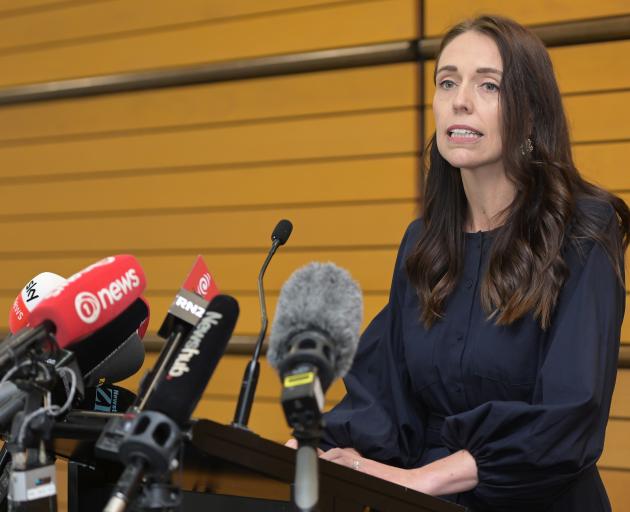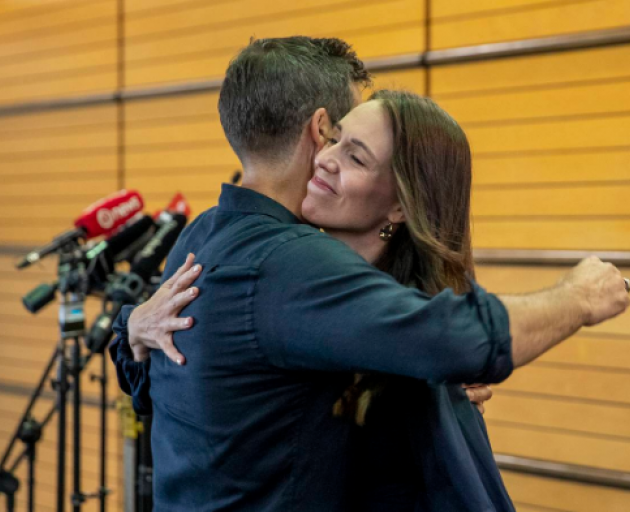Jacinda Ardern has stunned the country by announcing her resignation as Prime Minister - effective from next month - saying she had "no more in the tank" and it was time to go.
- Analysis: Ardern's legacy her leadership in a crisis
- Politicians react to resignation
- Aussie PM praises Ardern
Ardern said she would stand down on February 7 but stay on as an electorate MP until the end of April to save the country a by-election. She also announced that New Zealand would go to the polls on October 14.
The 42-year-old made the announcement in Napier, where the Labour Party's caucus retreat is being held.
An emotional Ardern said it had been a tough five and a-half years as leader and that she was only human and needed to step aside.
"This summer, I had hoped to find a way to prepare for not just another year, but another term - because that is what this year requires. I have not been able to do that," she told a news conference this afternoon.
"I know there will be much discussion in the aftermath of this decision as to what the so called 'real' reason was... The only interesting angle you will find is that after going on six years of some big challenges, that I am human," she continued. "Politicians are human. We give all that we can, for as long as we can, and then it’s time. And for me, it’s time."
She said she had reflected on her own future. "This has been the most fulfilling five and a-half years of my life."

Deputy Prime Minister and Finance Minister Grant Robertson told Ardern that he would not be putting his name forward.
Labour had taken the decision to choose a new leader within three days and Ardern believed her team were well placed to take New Zealand forward and contest the next election.
“I am not leaving because I believe we can’t win the election - but because I believe we can and will.”
Ardern said there was no secret scandal behind her resignation: “I am human. We give as much as we can for as long as we can and then it’s time. And for me, it’s time.
“I am leaving because with such a privileged job comes a big responsibility. The responsibility to know when you are the right person to lead - and also when you’re not.”
Ardern said she would stay as an MP of Mt Albert until April to avoid the need for a byelection. She had no plans beyond that as yet, and was looking forward to spending more time with her family.
She said she had the support of her family to continue as leader - but they had also supported her decision to step down.
Her partner Clarke Gayford was in the room for the announcement and she also mentioned her young daughter, Neve.
“To Neve, mum is looking forward to being there when you start school this year. And to Clarke, let’s get married.”
She said had not yet told Neve: “4-year-olds are chatty - couldn’t take the risk.”

She said caucus was surprised when she told them, but they understood.
“If I don’t have what it takes, I need to let someone else take on this job,” she said.
They could see she had given everything and did not begrudge her decision.
“As someone who always tried to be kind,” is how she would like New Zealanders to remember her.
Ardern said one of her great privileges was working with Māori. She recalled a marae in Rotorua, being welcomed with a pōhiri and the weight of the job hit her. She said she felt the Government had made progress in working with Māori.
She said Labour was the party that had the policies to support New Zealanders. The country had one of the world’s strongest economies despite headwinds.
Asked if there was a specific time when she made the decision, Ardern said near the end of last year she knew she needed the summer to see if she had what it takes to continue.
“Once I realised that I didn’t, I knew unfortunately there was not much alternative other than to hand over now.”
She gave some thought about if she could end the term, but the system did not allow for that.
Asked the traits to make a good Prime Minister, Ardern said the top of the list was “empathy”.
“Unless you can work to comprehend the experience of others it is very hard to deliver solutions and respond to crises without that starting point. That has been a really important principle for me.
“If you ask someone of my generation what they believe a politician to be and to name some of the traits, I doubt they would list kindness, doubt they would list empathy. But I hope the next generation does.”
Empathetic leader
Ardern's initial election as Prime Minister five and a-half years ago made a big splash on the global stage because of her gender and youth, coining the phrase "Jacinda-mania".
Her empathetic leadership style was cemented by her response to the mass shootings at two mosques in Christchurch in 2019 that killed 51 people injured 40.
Ardern swiftly labelled the attacks “terrorism” and wore a hijab as she met with the Muslim community a day after the attack, telling them the whole country was “united in grief”.
She promised and delivered major gun law reform within a month.
Ardern won plaudits across the political spectrum for her handling of the Covid-19 pandemic, which saw the country face some of the strictest measures globally but also resulted in one of the lowest death tolls.
But her popularity has waned over the past year as inflation has risen to nearly three-decade highs, the central bank has aggressively increased the cash rate and crime has risen.
New Zealand has become increasingly politically divided over issues such as a government overhaul of water infrastructure and the introduction of an agricultural emissions programme.
Political commentator Ben Thomas said Ardern's announcement was a huge surprise, as polls still ranked her as the country’s preferred Prime Minister even though support for her party had fallen from the stratospheric heights seen during the 2020 election.
Thomas said that there was not a clear successor.
Jacinda Ardern’s full statement
"Being Prime Minister has been the greatest honour of my life and I want to thank New Zealanders for the enormous privilege of leading the country for the last five and a half years," Jacinda Ardern said.
"With holding such a privileged role comes responsibility, including the responsibility to know when you’re the right person to lead, and also when you’re not.
"I have given my absolute all to being Prime Minister but it has also taken a lot out of me. You cannot and should not do the job unless you have a full tank, plus a bit in reserve for those unplanned and unexpected challenges that inevitably come along.
"Having reflected over summer I know I no longer have that bit extra in the tank to do the job justice. It’s that simple.
"I have spoken to the Governor-General this morning to let her know.
"In addition to our ambitious agenda that has sought to address long term issues like the housing crisis, child poverty and climate change, we also had to respond to a major biosecurity incursion, a domestic terror attack, a volcanic eruption and a one in one hundred year global pandemic and ensuing economic crisis. The decisions that had to be made have been constant and weighty.
"I’m incredibly proud of what we’ve achieved over the last five years in spite of the many challenges thrown at us. We’ve turned around child poverty statistics and made the most significant increases in welfare support and public housing stock seen in many decades.
"We’ve made it easier to access education and training while improving the pay and conditions of workers. And we’ve worked hard to make progress on issues around our national identify - I believe that teaching our history in schools and celebrating Matariki as our own indigenous national holiday will all make a difference for years to come.
"And we’ve done that while responding to some of the biggest threats to the health and economic wellbeing of New Zealanders, arguably since World War Two.
"The Labour team are incredibly well placed to contest the next election. They are the most experienced team in the country and have shown they have the skills necessary to respond to whatever comes their way.
"I’m not leaving because I believe we can’t win the election, but because I believe Labour can and will win it. We need a fresh set of shoulders for the challenges of both this year and the next three.
"As to my time in the job, I hope I leave New Zealanders with a belief that you can be kind, but strong, empathetic but decisive, optimistic but focused. And that you can be your own kind of leader - one who knows when it’s time to go."
Election date announced
This year’s election will be held on Saturday, October 14.
Ardern ordered her ministers to consider which reform areas should be the priorities for the year over the summer - and which should be scrapped as Labour moves to try to wipe some controversial policies off its plate.
The first Cabinet meeting of the year would be next Wednesday, after MPs visit Ratana on Tuesday.
The Labour caucus is in Napier, where National is also having its caucus retreat 2km away. Media are usually invited in for Ardern’s opening remarks to the caucus - but this year the venue was closed to media until before her announcement.
MPs discussed election strategies in the morning session.
That was prompted by concerns the venue was not soundproof, and the party did not want the discussions overheard.
National Party leader Christopher Luxon unveiled his reshuffle this morning, including significant promotions for former leaders Judith Collins and Todd Muller.
Muller has been promoted into the shadow Cabinet and secured the agriculture portfolio and climate change. Collins has been promoted to the front bench - at 10. She was previously at the tail end of the shadow Cabinet, and has announced her intention to stand again in 2023, getting re-selected as the candidate in her Papakura seat.
Luxon’s fellow first-term MP Penny Simmons has also squeaked into the shadow Cabinet at 20.
Labour’s retreat will wind up with a dinner tonight while National has a second day of meetings tomorrow.











